- Home
- Joseph O'Connor
Shadowplay Page 2
Shadowplay Read online
Page 2
A balladeer so thin that you could see the bones of her arms was singing a song but the ballad was in English. ‘Little Holmwood,’ someone said it was called. And then came the dreadful news from inside the courthouse. The magistrate had died, alone in his chamber, sat down to sign the death warrant but at the instant when he’d donned the black wig his heart and eyes had burst. Blood had gushed from him in torrents, drenching the floor of his chamber, until only his flesh and bones were left, like an empty suit. The prisoner had escaped. ‘The devil’s work’ had been done. Some of the people nodded coolly while others crossed themselves or walked away. The ballad-maker never stopped singing.
Returned to Dublin, he’d been restless, shaken by what he’d witnessed. There was something terrifying about the singer’s imperviousness, if that’s what it was. Behind it, dark murmurings nagged at him, as though the song had caused the death.
Unable to sleep, he had resorted to laudanum but it hadn’t worked, left him feeling worse, disconnected, prey to red visions. The following night he attended the theatre, arriving late from his work at Dublin Castle. A few months previously he had begun reviewing for the literary pages of a newspaper. There was no money but it afforded free passes.
The play was into its third act by the time he arrived. A rainstorm was roaring outside. Soaked, cold, in the darkness he couldn’t find his seat so he stood in the aisle near the prompt chair. Lightning sparkled through the high windows of the theatre – like many old playhouses, it had once been a church. The gasps of the thunderstruck audience.
Henry Irving stopped in mid scene and stared down at them grimly, his eyes glowing red in the gaslight. Paint dribbling down the contours of his face, like dye splashed on a map, droplets falling on his boots, his doublet and long locks drenched in sweat, his silver-painted wooden sword glittering in the gaslight, shimmering with his chain-mail in the lightning. For what felt a long time he said nothing, just kept up the stare, slinking towards the lip of the stage, left hand on hip, wiping his wet mouth with the back of his sleeve. Sneering, he regarded them. Then he spat.
As the gasps arose again, he resumed speaking his lines, insisting he’d be heard, that their revulsion didn’t matter, that in fact it was essential, a part of the show, a gift without which this play about evil couldn’t happen.
‘’Tis now the very witching time of night, when churchyards YAWN’ – he opened his maw wide and let out a rattling groan – ‘and HELL ITSELF breathes out contagion to this world!’ He shook, clutched at his throat, as though about to vomit. ‘Now could I drink hot blood and do such bitter business’ – gurgling the terrible words – ‘as THE DAY WOULD QUAAAAKE TO LOOK ON.’
By now the people were screaming. He began to scream back. Not a shout, not a bellow – a womanly scream. Plucking the sword from its scabbard, swirling at the air, screaming all the while like a banshee. It was frightening, too discomfiting. A man shouldn’t scream. Some in the audience booed, tried to leave, others rose in stampedes of operatic cheers, from the gods came the thunder of boot-heels on the floorboards. Stoker, in the thronged aisle, felt thirsty, faint.
He turned and looked at the cheap seats, behind the cage.
Punks, drunkards, the disgorged and disgusting. Warted, thwarted vagabonds, rent-boys in drag. Madwomen, badwomen, gougers on the make. Fakers, forgers, mudlarks, midgets, Bridgets on the game and rickety Kitties. Oozers, boozers, beaters, cheats, picklocks, urchins, soldiers on leave, poleaxed goggle-eyed poppy-eating trash, refugees from the freakshows and backstreet burlesques. And the smell. O dear Jesus. It buffets you like a gust, layers of fetid fetor and eyeswater yellow like the smoke from a train to Purgatory.
Why do they come here? Stoker doesn’t know. All he knows is that they do come, they always will. If they screamed at the pain of their irrelevance, no one would listen. They need someone to scream for them. Henry Irving.
On the train for Bradford, memory comes to Stoker in Present Tense, as though recollecting the other man that every man contains.
Weak, trembling, the young critic makes his way to the street and walks around the building to the stage door. Already the crowd has begun to assemble. The play is still on – you can hear the muffled shouts of the actors – but the people are here, in the rain. Dozens, scores, soon hundreds. A covered carriage clops up, the horses nervous, stamping, the driver shouting at the people to move away, there’ll be an accident. Policemen arrive and try to hold them back, the crowd pushes towards the doorway, chanting his name.
Irv
Ing.
Irv
ing.
Suddenly, roughly, two ushers emerge, one carrying an umbrella, the other a truncheon, hurrying him out like a boxer from the ring, through the storm of little notebooks pleading for autographs, through the macabre forest of outstretched scissors pleading for locks of his hair, and up the folding steps to the carriage. He’s still in his stage clothes but with a raincoat thrown over him and a bottle of champagne in his hand.
As the carriage pulls away down Sackville Place, the police manage to barricade off the rabble.
‘Stay where you are if you’d be so good, sir, this street is closed.’
‘I work at Dublin Castle,’ Stoker says quietly, showing the credential badge in his wallet. ‘I am on government business. You’ll want to let me through.’
Why does he follow? What is he doing? The last tram for Clontarf is about to leave from the Pillar and he needs to be on it, but he’s not. Ahead of him, the carriage is now approaching the bridge. He walks slowly at first, stumbling on the greasy pavement, straining to see, now hurrying.
On the southern side of the bridge, the carriage is stopped by a herd of cattle being driven to market and he catches up. When it jolts off again, through a minefield of cowpats, he continues. Round by Trinity College, where he took his mediocre degree, along Nassau Street, up Dawson Street, along by the Green, the shop windows shining with rain.
Under the arms of a dripping aspen on the edge of the park, he watches as the tall-hatted cabbie dismounts and opens the carriage door. The Shelbourne Hotel is shining like a palace in an illustration of Christmas, the crystal lamps on its pillars blaze.
For some reason there is a delay. He pictures the rooms, sees himself moving through them, the great splendour of the ballroom with its Italian marble and gilt, its orchestra playing Mouret’s ‘Sinfonie de Fanfares’, portraits of judges and aristocrats in the alcoves, ice-buckets, upended bottles, shucked oysters, innocent apples, maids tactfully dusting nude statuettes. In his mind’s eye he sees Irving striding through the furnace-like opulence, waiters take his hat, his gloves, his cane, the maître d’ beckons towards a discreet table behind the ferns.
Rain on the aspens. A concierge and a pageboy hurry out through the glass doors with umbrellas. From the carriage alights a gracious woman in a long fur cloak. She pauses a moment, looks up at the sky, enters the hotel. The carriage clops away.
Winterbourne: a river that is dry in summertime.
— II —
In which a review is submitted and an unwelcome visitor avoided
In the night-traders’ hut off the back laneway near the Fruit Market, he summons up a mugful of what purports to be coffee and souses it with a measure of hard Jamaica rum, the cheapest, most intoxicant brand. To be here among the whores and drunken squaddies, the dregs of the late night city, the outcasts. He likes to listen to their prattle, the juice of it, the spite. They address him as ‘Your Honour’, not entirely ironically. They regard him as an oddity, a kind of queer mage; it disconcerts them that he writes in shorthand.
Sometimes they ask him to explain the runes in his notebook, finding it hard to believe that a squiggled symbol could be a word. They’re right. It is hard. He is careful to speak to everyone here with respect. Being among the night people, it settles something in him. At home in his room, he can’t write. The words turn to ashes. Here they bubble and spew, in the wake of the rum.
He likes to watch the weary farmers arriving, bog-eyed, from the country with their carts, the traders returning in wagons from the quays, hefting boxes of American apples, Dutch flowers, English cornmeal; the butchers in their bloodstained whites. To think of the city sleeping while so much life is thrumming on – it makes him feel a co-conspirator.
As he bends to the page and continues to jot, among the inconvenient, the filthy, the deliciously malicious, he realises the song is with him, circling like a phantom in Dickens, an imprecation of guilt, and he wonders if it will ever let him be.
O Mother, where’s the bonny boy
Come here last night to stay?
‘He’s dead in Hell, no tales can tell,’
Her father he did say.
‘Then Father, cruel Father, you shall die a public show
For the murder of John Holmwood,
Who ploughed the lowlands low.’
Now he’s walking the north quays of the Liffey, breasting into the slab of wind, through a swirl of dirty gulls and old newspapers. The strange forlornness of Dublin on a midweek night, empty, ghostly, murderous. At the weekend there might be the hope that Lady Wilde will be having one of her soirées, the cultured young men and women, the wit, the fine food, the flirtations on the elegant staircase where one might meet someone beautiful, even a better version of the self. But a Wednesday night in Dublin is the loneliest in the world, dark windows, shuttered doorways, locked shops, empty offices, night-thoughts monkeying at him if he tries to sleep. The only way he can endure it is to walk.
First light coming now. Smacks heading down the estuary, trailing petticoats of nets, out towards the expanse of the sea. The last bedraggled tarts streeling home to their rooms. He’s afraid to glance at his fob watch, doesn’t want to know the time.
The
bay looms in his mind, the surge of the breakers, the lugubrious moan of the lighthouse foghorn. The ghost of a drowned sailor chained to the mast of an ice-caked ship with a sail stitched from hanged men’s shrouds. An image from a play he’s been trying to write. But he doesn’t have a shape for it yet.
Other Irish writers he knows about are interested in Ireland. He has tried to read them, to feel at one with them, but he has failed. They have organised themselves into clubs, little academies of pipe-smoking and mysticism, which meet on a Monday evening to bathe in the Celtic twilight or translate epic poems nobody sane wants to read in any language, before everyone trams home to the suburbs. The folktales, the myths, the faeries, the banshee, the stuff his Sligo mother used to mumble about after a sherry or two. All that dusty old fustian Hibernian rubbish, only remembered by the expired and the mad. While he can see it contains momentum of a certain clunking sort, it leaves him unmoved, it’s like looking at drizzle. The mannequins who ponce and howl across this island of sodden failure, shown but never said to be vainglorious thugs, said but never shown to be heroic or admirable, seem to him devoid of shadowplay, pallid imitations of something not quite named, children’s drawings where a Caravaggio is needed. At least in the theatre, there must be an audience. If there isn’t, the play will close early.
He passes the Customs House, enters a gloomy old office building that for a hundred years has despised its reflection in the Liffey, crosses the flagged floor, climbs the steep dark staircase, his strong body now creaking with tiredness. On the third landing, he comes to an office door on which a plaque announces night editor. Before he can knock, it opens. Mr Maunsell regards him.
‘Bram, my dear gossoon. You’re out early. Isn’t it horrid cold?’
‘Actually I am out late.’
‘Won’t you step in for a moment, I was about to wet the tea? What’s that you have there? I wasn’t expecting anything from you this week.’
‘My review. Henry Irving. In Hamlet last night.’
The night editor rubs his right eye and utters a yawn of withering bleakness as he starts looking over the pages. The clay pipe in his mouth is empty but he sucks on it nonetheless; the whistling slurp is one of those little unpleasantnesses that seem worse when we are tired. He is a small man who looks smaller, somehow, during the hours of semi-darkness, a minor dandy in emerald green eye-shade, shabby porcelain-buttoned waistcoat and scarlet braces. They say he has a fancy-woman in Kimmage.
‘Hamlet, eh, Bram? Doubt thou the stars are fire.’
‘Indeed.’
‘I don’t know, lad, I don’t know. Bit rich for our blood? Heaven bless them, the readers of the Dublin Mail wouldn’t be experts on the Bard.’
‘One needn’t be an expert to appreciate a play. I am not an expert myself. Neither was Shakespeare.’
‘Shakespeare wasn’t an expert on Shakespeare?’
‘He saw himself as a craftsman. Like one of the carpenters in his theatre.’
‘I’d been meaning to have a word with you about the theatre, Bram. Not quite the thing? Bit lacking in properness, the ladies a tad loose, one or two of the chaps a bit – you know.’
‘A bit what?’
‘A bit Haymarket Harvey? I’m a man of the world myself but I’ve advertisers to think about. Maybe you’d widen your purview?’
‘How so?’
‘You don’t happen to have a cat?’
‘No I haven’t.’
‘The readers love a heart-warming little article about a cat. Especially if it’s missing a leg.’
‘I shall bear that in mind.’
‘Or the poor auld faithful hound won’t leave his master’s grave? They lap that stuff up and come cantering back for more. Or some good respectable hard-working lad but he falls into bad company and takes to the gin until it drives him astray in the head and he strangles the fiancée, you know, a morality fable? Or he ruins her and she’s left with no choice bar going on the game. Temperance sells a barrow-load of papers these days.’
‘Irving has stated in many interviews that he means to make theatre respectable.’
‘A rose by any other name, though. You don’t mind me speaking frankly? There’s those who do be saying your beloved Irving is a bit off.’
‘Meaning?’
‘A glorified panto showman, bit of a carnival barker.’
‘I consider him a great artist and a peerless genius.’
‘That’s lovely. I consider him my bum.’
‘I can offer the review elsewhere. Since you’re not paying me, there can be no hard feelings.’
Mr Maunsell chuckles. ‘Doesn’t the queen pay you, mister honey? She’s well able to, God knows.’
‘So you’ll take it?’
‘What’s the hurry. Hold your hour and have tea.’
‘I need to know. Now.’
‘You’re a strange piece of work, young Stoker.’
The alarm clock rattles out its shattering-glass summons. He gropes from the bed and quiets it. For a moment, his dead father is in the wardrobe mirror’s reflection, black birdcage in hand; after-image from an uneasy dream. The reek of the chamber-pot rising from the corner, sleet beating angrily on the window. Forty minutes of sleep are better than nothing. But only by forty minutes.
Quarter of an hour later, he’s running on Clontarf Beach, barefoot, in jockey’s jodhpurs and boxer’s singlet. He runs two miles every morning, no matter the weather, has been doing it daily for years, a part of his routine. As a child he was often ill, confined to bed for months, years. That won’t be happening again.
He listens to the pounding of his feet on the sand, the slop of the wavelets as he slaps across the runnels, the buffeting wind, the hiss of the creaming foam, the interior metronome of his breath. He stops and shadow-boxes, then a hundred press-ups and a dip. The shocking cold of the water, the zest of the salt.
Above him, the vast bowl of the Irish sky, placid, glassy, hardly ever changing, a bell jar beneath which the specimens writhe as they await the latest experiment. Now he sees the Kingstown ferry, far out in the bay, bobbing towards the Muglins before it faces out for Holyhead.
The pull of London is so strong for him that he senses danger in the magnetism. His few visits to the capital for his work have left him wheezy, feverish, as though there is something in Piccadilly’s dust designed to resurrect his ashen boyhood. The city has seen him too hot in the summertime, petrified in winter, thirsty in vast parks, hungry in galleries, awestruck in huge museums stashed with imperial lootings, afraid to open his mouth for fear the indigenes might form views about his accent. The beggars of Holborn seem so ardent, as though it is they who secretly rule, as though the gentry are unwitting extras in the show.
And London has too many hidden streets, too many alleys and back lanes where everything is available for a price. The hovels behind Paddington Station, the pleasure garden in Chelsea, the secret map of a city that roils with availability. A whisper in the club, a nudge, a nod, these are the signposts. He fears the destinations.
There are times when he has considered the United States, perhaps Chicago or Boston or New York. It’s said that men and women may remake themselves there, start the journey afresh with new outlooks and policies, new ways of speaking, even a new name if required. No one cares where you came from. You write your own story. But he wonders if that can be true.
In his daydreams he sees the great buildings, the long canyons of the avenues, hears the iron-jawed clatter of factories, the blowsy, brash place-names: Cincinnati! The Bronx! Baton Rouge! But this pitch and bopping punchiness of a new republic doesn’t appeal to him. He imagines he’d find it tiresome.
The consolation about Ireland is that nothing will ever happen here now. The fighting days are done, the years of wars and revolutions. The gallows won out in Ireland, as in India, as everywhere. To assert that the pen is mightier than the sword is only to float a fiction, a means of encouraging the sort of rebelliousness that changes nothing.
He shadow-boxes on the beach as the ferry glides by and the jockey’s boy goes walking the horses. Nobody minds what you’ll be doing because you won’t be doing anything. Not that it would matter if you did.

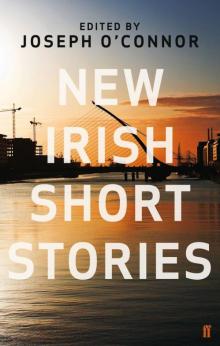 New Irish Short Stories
New Irish Short Stories The Salesman
The Salesman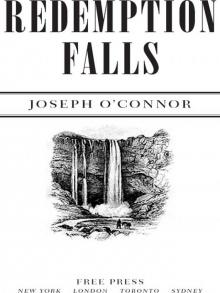 Redemption Falls
Redemption Falls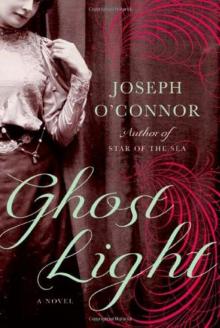 Ghost Light
Ghost Light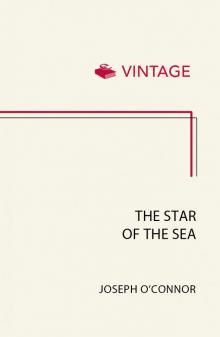 Star of the Sea
Star of the Sea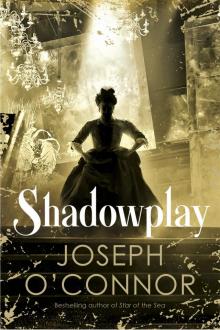 Shadowplay
Shadowplay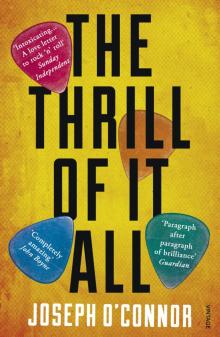 The Thrill of It All
The Thrill of It All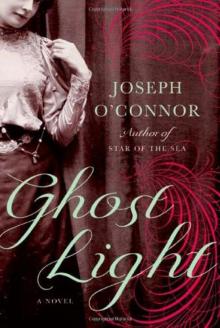 Ghost Light: A Novel
Ghost Light: A Novel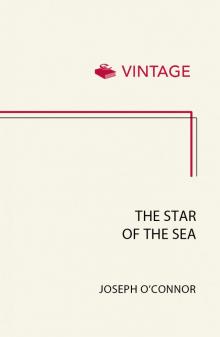 The Star of the Sea
The Star of the Sea